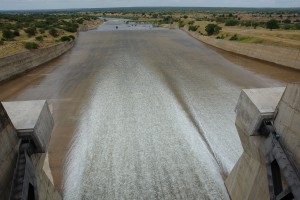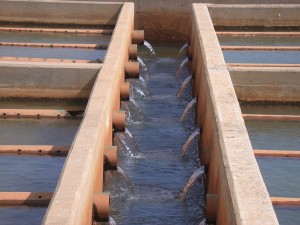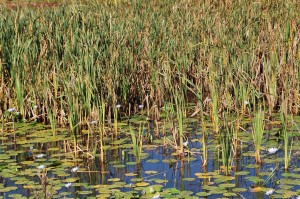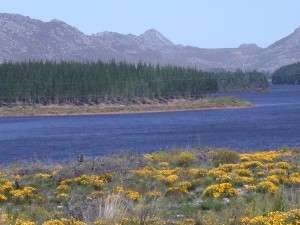CHAPTER < TWELVE - FINDING SUSTAINABLE SOLUTIONS CONTD.
 Just as the agricultural Green Revolution with its technological innovations kept the sceptre of world hunger at bay for a while, so the water conservation strategies of the Blue Revolution will help to alleviate chronic or recurring shortages of fresh water as we move further into the 21st Century.
Just as the agricultural Green Revolution with its technological innovations kept the sceptre of world hunger at bay for a while, so the water conservation strategies of the Blue Revolution will help to alleviate chronic or recurring shortages of fresh water as we move further into the 21st Century.
Already as with advances in agriculture, much has been done and is continuing to be done in many different quarters to get the Blue Revolution under way, and every little bit helps. Whether this is by changing rapid-flow showerheads to low-flow ones and repairing leaky pipes in our homes, to recycling wastewater used in industry and reverting to drip irrigation in agriculture.
Conserving water is as much a mindset as anything else. It is a mindset that looks for water savings in every situation; in every factory and in every field and in every home around the world, teaching children young enough to pour their first glass of water, the importance of turning the tap off afterwards and not leaving it dripping; the underlying message being, that water is a most precious commodity and not one to be wasted. For ultimately savings in water usage, wherever they can be obtained and however small, will be a key factor in surviving a thirsty future.
Water has been called “Blue Gold”. It has also been described as “a liquid more important than oil”. Yet there are only two ways that we can meet the world’s growing needs for clean, fresh water. On the one hand we can increase our supplies through efficient water harvesting and catchment management. And on the other hand we can use the water that we have more effectively through ongoing research into areas such as water purification and non-flush dry sanitation technology.
With clean water stewardship increasingly becoming a global imperative, water resources management is requiring, and receiving, a holistic and integrated approach from all stakeholders; whether they be national governments, local governments, water management bodies, water researchers, industry, agriculture or domestic users alike.
 Water economy has been the impetus behind some impressive water savings initiatives and clever technologies. Research is also currently under way to find cost-effective ways of neutralising acid mine drainage, the pH factor often being the most important parameter to be adjusted during industrial effluent treatment, with mining industries carrying out extensive studies to evaluate possible sulphate removal technologies. This trend toward cutting water consumption and increasing purification and recycling is growing as people become more aware of the need for water conservation. Educational and environmental awareness programmes, incentives and penalties will further hasten this encouraging development into the future.
Water economy has been the impetus behind some impressive water savings initiatives and clever technologies. Research is also currently under way to find cost-effective ways of neutralising acid mine drainage, the pH factor often being the most important parameter to be adjusted during industrial effluent treatment, with mining industries carrying out extensive studies to evaluate possible sulphate removal technologies. This trend toward cutting water consumption and increasing purification and recycling is growing as people become more aware of the need for water conservation. Educational and environmental awareness programmes, incentives and penalties will further hasten this encouraging development into the future.
With water scarcity being the “mother of invention”, some remarkably creative conservation solutions have been developed as noteworthy examples of human ingenuity. One such invention is a non-flush, dry sanitation toilet developed by a South African company, which uses no water, power or chemicals and which has the added advantages of being hygienic, odour-free, cost effective, low maintenance and environmentally friendly.
As a further initiative towards water conservation, water knowledge is being swapped and shared around the world. This international transference of knowledge from one stakeholder to another has given rise to encouraging developments such as waste minimisation clubs which represent a pooling of information among industry members: participants receiving the assistance of experts in the development of technology strategies for specific applications, such as the utilisation of reverse osmosis water treatment systems for reusing effluent. And proactive efforts are under way in many parts of the world to clean up polluted groundwater sources in order to improve water quality, as well as developing initiatives to protect important rivers from potentially catastrophic mishaps such as industrial accidents; also regulating the building of industrial and chemical factory plants on river shores.
 Away from urban areas with their homes, offices, shops, factories, and municipal works, efforts are also in progress to reclaim wetlands with research projects on water ecosystems in natural environments generating useful information, which is also being shared across international boundaries and between concerned stakeholders.
Away from urban areas with their homes, offices, shops, factories, and municipal works, efforts are also in progress to reclaim wetlands with research projects on water ecosystems in natural environments generating useful information, which is also being shared across international boundaries and between concerned stakeholders.
In an ideal world affordable access to clean fresh water for drinking, personal hygiene and sanitation should be a fundamental human right for all people everywhere on Earth. Certainly this is an ideal worth striving for in the future. However we are a long way from this positive state of affairs and as water is an essential resource, it could be a crucial factor in relation to global stability and even survival. As such it should be protected, developed, conserved and controlled by people who have the best interests of the greatest number of other people at heart: ethical, wise and responsible people with nothing to gain from water’s misuse or abuse.
How we use the water that we have says a lot about us as a species. It says that at times we can be heartbreakingly careless, squandering essential supplies with unthinking extravagance. However, we also have the capacity to be encouragingly thrifty and resourceful when the chips are down and we realise the importance of water conservation. The need to stretch water resources as far as possible has already brought out, and is continuing to bring out, the very best in us as evidenced by the international sharing of knowledge and the development of innovative technological solutions.
But unfortunately, as with so much else, the scrambling for scarce supplies also has the potential to bring out our darker side and we are already seeing this sobering aspect of our collective nature in the attempts of some to corner the world water market; attempting to sell this vital resource to the highest bidder like any other common or garden saleable commodity. This is an act that would effectively ensure even greater thirst, want and suffering for the world’s poor; driving a deeper wedge between the haves of the predominantly water-rich developed countries and the have nots of the water-strapped developing countries.
 As in all things, having enough encourages equanimity and having too little ferments dangerous insurrection. The management of our planet’s water, a resource essential for the lives of the entire world’s people, as well as the multitude of animal and bird species with which we share the planet, may provide a definitive test for the human race. On the one hand water terror could tear us apart, exacerbating social tensions and causing deep divisions, potentially leading to devastating water wars.
As in all things, having enough encourages equanimity and having too little ferments dangerous insurrection. The management of our planet’s water, a resource essential for the lives of the entire world’s people, as well as the multitude of animal and bird species with which we share the planet, may provide a definitive test for the human race. On the one hand water terror could tear us apart, exacerbating social tensions and causing deep divisions, potentially leading to devastating water wars.
However, on the other hand it could unify our differences and solidify our human allegiance, becoming a test that we pass with flying colours. As with so much else, the path we follow in the time ahead will be determined by our attitudes and beliefs, ethics and concerns. Hopefully the gains of the Blue Revolution will tip the balance of global water availability toward a situation whereby we can proceed into the future confident that if we don’t have an abundant supply to generously meet the needs of most of the world’s people, at least we will have enough water and technological know-how to begin an equitable sharing, acting out our highest potential in the spirit of the common good until other, more technologically and socially advanced solutions can be found…